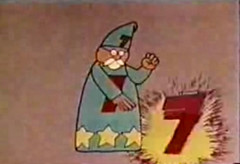Recalled to life
A friend of ours is an amateur Portland historian/collector, and on Friday he showed me and Hilary his latest acquisition: a deck of playing cards, each bearing the image of some library, theater, park, or municipal building prominent in the life of the city at the time of the cards' manufacture. He found this rarity through a well-known electronic auction site, which fact Hilary considered a tremendous disappointment, and later, privately, she expressed surprise that someone might take pride in having advanced his collection by such unpoetical means. I was initially inclined to defend the collector, but I came around to Hilary's opinion on the influence of the provenance of artifacts on their aura and charm. The chain of events leading to our encounter with some object matters greatly to its power over us. Awe and wonder are reserved for the object that shows up by accident. An improbable object may arouse our interest, but an improbable discovery excites our feeling of life. (And if you set out looking for improbable discoveries, you may skunk the whole thing in advance.)
Perhaps it is a mark of the collector that he has abandoned concern for the object as an individual. However the object may be distinguished from others—as monophonic, pre-CBS, bound in signatures, or whatever—the collector values it not as a singular, inexplicable event in an experience of the world, but as a member of a kind, whose worth is determined by its place in a system of objects rather than by the unique grace of its arrival in a life. A collector may hope that some strange feature of the new acquisition will shock him as his old, original favorites once did, before he replaced his wonder at them with knowledge, but it is fruitless and contradictory to attempt to prepare such shocks for oneself. A true discovery presents itself not as so much fuel for a dying passion, but as a sublime discontinuity, announced with all the force of the recognition that there is something rather than nothing.
Perhaps it is a mark of the collector that he has abandoned concern for the object as an individual. However the object may be distinguished from others—as monophonic, pre-CBS, bound in signatures, or whatever—the collector values it not as a singular, inexplicable event in an experience of the world, but as a member of a kind, whose worth is determined by its place in a system of objects rather than by the unique grace of its arrival in a life. A collector may hope that some strange feature of the new acquisition will shock him as his old, original favorites once did, before he replaced his wonder at them with knowledge, but it is fruitless and contradictory to attempt to prepare such shocks for oneself. A true discovery presents itself not as so much fuel for a dying passion, but as a sublime discontinuity, announced with all the force of the recognition that there is something rather than nothing.


0 Comments:
Post a Comment
<< Home